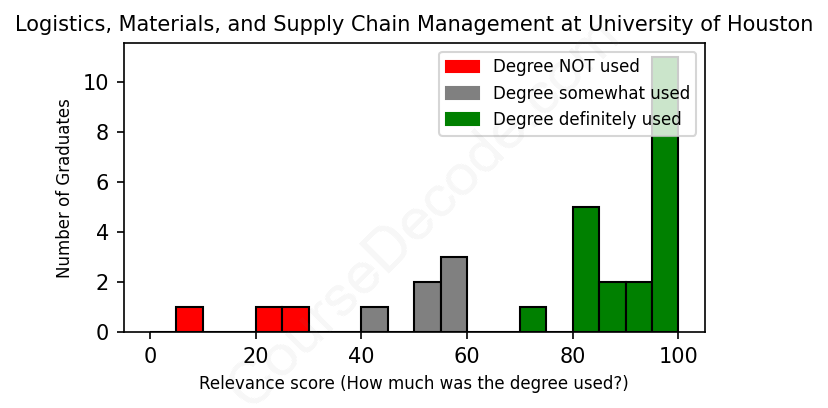
First, some facts. Of the Logistics, Materials, and Supply Chain Management graduates from University of Houston we've analyzed , here's how many have used (or NOT used) their degree in their career:

These are estimates based on AI analysis of 30 LinkedIn profiles (see below).
The verdict? Above average. Overall, with an average relevance score of 76%, Logistics, Materials, and Supply Chain Management graduates from University of Houston have a higher likelihood (+9%) of finding work in this field compared to the average graduate across all fields:
And for comparison, here's the chart for all profiles we've looked at across all degrees.
Also, after graduating, only 6% of these graduates have pursued further education other than another Bachelor's degree (such as a Masters degree or other), compared to the average across all profiles of 35%. This suggests a Bachelors degree is enough for most Logistics, Materials, and Supply Chain Management graduates, and it's normal to look for work straight after graduation.
See the details:
|
Relevance score: 100% We think this person has gone into a career highly relevant to their degree. We think this person has gone into a career highly relevant to their degree.
DEGREE INFOGraduated in 2013 from University of Houston with a Bachelor of Business Administration (BBA) in Logistics, Materials, and Supply Chain Management. No other secondary education since. JOB HISTORY SINCE GRADUATIONSourcing Specialist Schlumberger Jun 2013 - Dec 2016 Supplier Leader  Schlumberger Jan 2017 - Nov 2022 Global Commodity Manager  Varian Nov 2022 - Present ABOUTSupplier Management/ Strategic Sourcing |
The top 10 most common jobs done by the graduates we've analyzed (ranked most common to least) are:
After analyzing the job profiles of University of Houston graduates with a degree in Logistics, Materials, and Supply Chain Management, a few clear trends emerge. The most common career paths include positions like Supply Chain Analyst, Transportation Manager, Procurement Coordinator, and various roles at logistics companies, such as Amazon and J.B. Hunt. Many graduates find themselves in positions where they directly apply their knowledge of supply chain principles, logistics operations, and procurement strategies, particularly in well-known organizations in the logistics and supply chain sector. It’s evident that the degree facilitates opportunities primarily in roles that are aligned with their educational background.
However, it’s also important to note that not every job held by graduates taps directly into logistics and supply chain management expertise. Some roles, such as those in customer service or safety management, may be more distantly related. While these positions may draw on some transferable skills from their education, they aren't centered on logistics competencies that the degree aims to develop. Therefore, while a significant number of graduates leverage their education in relevant positions, there’s a noticeable mix of roles that either fully utilize the degree or fall short of its core competencies.
Here is a visual representation of the most common words in job titles for Logistics, Materials, and Supply Chain Management graduates (this is across all Logistics, Materials, and Supply Chain Management graduates we've analyzed, not just those who went to University of Houston):

Graduates from the University of Houston with degrees in Logistics, Materials, and Supply Chain Management generally demonstrate a solid career trajectory, often stepping into positions closely related to their field right after graduation. Many land first jobs as supply chain analysts, logistics coordinators, or roles in procurement and market research. For instance, graduates from 2012 and 2013 started as interns or associates and moved into roles that suggest a steady climb within the industry. It’s notable that several have maintained positions in well-regarded companies like Samsung and J.B. Hunt, indicating a trend of advancement within organizations that value their education and training.
Five to ten years post-graduation, these professionals typically find themselves in more senior roles. Many have transitioned into managerial positions, such as supply chain managers and strategic sourcing specialists. It's common to see them take on roles with increased responsibility, reflecting both their experience and the ongoing demand for supply chain expertise in various industries. While not every single graduate directly matches their degree with their current role (as seen with some branching out into unrelated fields), a significant number remain entrenched in logistics and supply chain environments, showcasing a generally successful outcome for graduates from this program. Overall, it paints a pretty positive picture for graduates seeking careers in logistics and supply chain management.
Honestly, the Bachelor’s degree in Logistics, Materials, and Supply Chain Management at the University of Houston isn’t overly tough, but it has its challenges like any other degree. You’ll dive into subjects like operations, inventory management, and data analysis, which can get a bit technical. If you put in the effort, keep up with your assignments, and don't shy away from teamwork on projects, you'll likely find a groove. Many students find it pretty manageable compared to more intense programs like engineering or nursing, but it’s still important to stay organized and engaged. So, if you're good at planning and enjoy problem-solving, you’ll probably do just fine!
Most commonly, in the LinkedIn profiles we've looked at, it takes people 4 years to finish a Bachelor degree in Logistics, Materials, and Supply Chain Management.
Looking at the career paths of these Logistics, Materials, and Supply Chain Management graduates from the University of Houston, it seems like most of them are doing pretty well financially. Many have climbed the corporate ladder relatively quickly, landing roles like Senior Managers, Directors, and specialists in sizable companies which typically pay decently or even quite well. For instance, positions at companies like Amazon, Schlumberger, and Hewlett-Packard usually come with good benefits and salaries, especially as they gain more experience. However, a couple of them took some longer routes with lesser-known roles before moving onto better-paying positions. In general, it looks like these folks are on track to make a decent living, which is encouraging if you’re thinking about a career in this field!
Here is a visual representation of the most common words seen in the "about" section of LinkedIn profiles who have a Bachelor degree in Logistics, Materials, and Supply Chain Management (this is across all Logistics, Materials, and Supply Chain Management graduates we've analyzed, not just those who went to University of Houston). This may or may not be useful:

Here are all colleges offering a Bachelor degree in Logistics, Materials, and Supply Chain Management (ordered by the average relevance score of their Logistics, Materials, and Supply Chain Management graduates, best to worst) where we have analyzed at least 10 of their graduates:
| College | Score | Count |
|---|---|---|
 Michigan State University Michigan State University
|
84 | 23 |
 Auburn University Auburn University
|
83 | 19 |
 Ashford University Ashford University
|
82 | 12 |
 University of Wisconsin-Milwaukee University of Wisconsin-Milwaukee
|
81 | 10 |
 Rutgers Business School Rutgers Business School
|
79 | 24 |
 Penn State University Penn State University
|
78 | 21 |
 Embry-Riddle Aeronautical University Embry-Riddle Aeronautical University
|
78 | 10 |
 Arizona State University - W. P. Carey School of Business Arizona State University - W. P. Carey School of Business
|
78 | 14 |
 Iowa State University Iowa State University
|
77 | 14 |
 University of Houston University of Houston
|
76 | 30 |
 University of Arkansas University of Arkansas
|
76 | 18 |
 University of Tennessee, Knoxville University of Tennessee, Knoxville
|
75 | 15 |
 University of North Texas University of North Texas
|
69 | 14 |
 Texas A&M University Texas A&M University
|
67 | 27 |
 Georgia Southern University Georgia Southern University
|
62 | 13 |
 The Ohio State University The Ohio State University
|
60 | 10 |
 University of Houston-Downtown University of Houston-Downtown
|
57 | 13 |